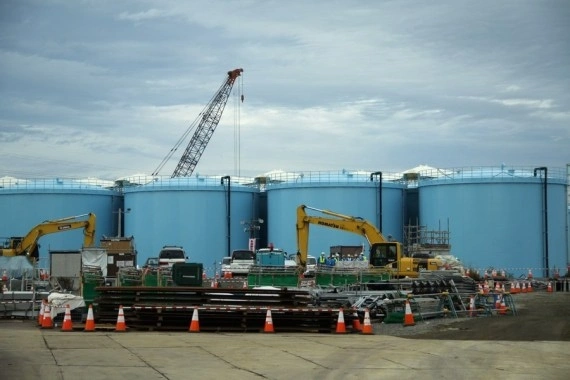

File photo of storage tanks at the Fukushima Daiichi nuclear plant Japan (Photo: Xinhua/IANS)
In a major policy shift that will have international ramifications, Japan has decided to restart its inactive nuclear power plants as well as develop the next-generation reactors to avert an energy crisis and go green.
At a conference on industrial transformation and decarbonization, Prime Minister Fumio Kishida said: “The government will take the lead in various measures to restart our nuclear power plants”, Japanese news agency Kyodo reported on Wednesday.
For Japan, this would be a big policy turnaround as it had turned its back on nuclear power after the disaster at the Fukushima nuclear plant in 2011. A massive earthquake and tsunami had caused the Fukushima nuclear catastrophe after which the country allowed its nuclear plants to go idle.
The country has already taken its first steps towards energy security through nuclear power.
Ten nuclear plants have already resumed power production while Kishida plans to restart another nine by the time winters begin and demand shoots up.
The government plans to restart more by next year.
Looking at the global energy crisis caused by the Russian attack on Ukraine as well as the fact that Japan has to reduce its carbon footprint, the country has decided to go nuclear. It is also staring at the winter months when power consumption would rise.
Japan is also trying to extend the life of the existing reactors beyond 60 years besides developing new technologies. This is a development where public opinion will have to be managed as people harbour concerns over the safety of old nuclear reactors which could be prone to accidents.
Kyodo says that the Ministry of Economy, Trade and Industry has already been studying the development of next-generation nuclear power plants and had previously released the envisioned development process of upgrading reactors with enhanced safety features.
The country has set a target of nuclear power generation of around 20 per cent of its total power supply by 2030.
Japan has been fast off the blocks to tackle the looming energy crisis. The third largest global economy after the US and China, it cannot afford to be lax over shortage of energy coupled with mounting prices.
It is also confronting a rising China that has forced Tokyo to up its defence budget and look afresh at its security architecture in the region.
Also Read: In message to China, Biden to shore up alliance with South Korea and Japan during East Asia visit
Taiwan's military is prioritising combat readiness as a key aspect of deterrence due to escalating…
Calling for an increase in the speed of development, Prime Minister Narendra Modi said on…
The Scottish Government has reaffirmed its commitment to supporting religious freedom and human rights for…
Tara Chand Baloch, the President of the Baloch American Congress and a former Cabinet minister…
In a groundbreaking study, researchers from McGill University have identified nine biological markers in the…
India, in a firm and unequivocal statement at the United Nations Security Council (UNSC), accused…